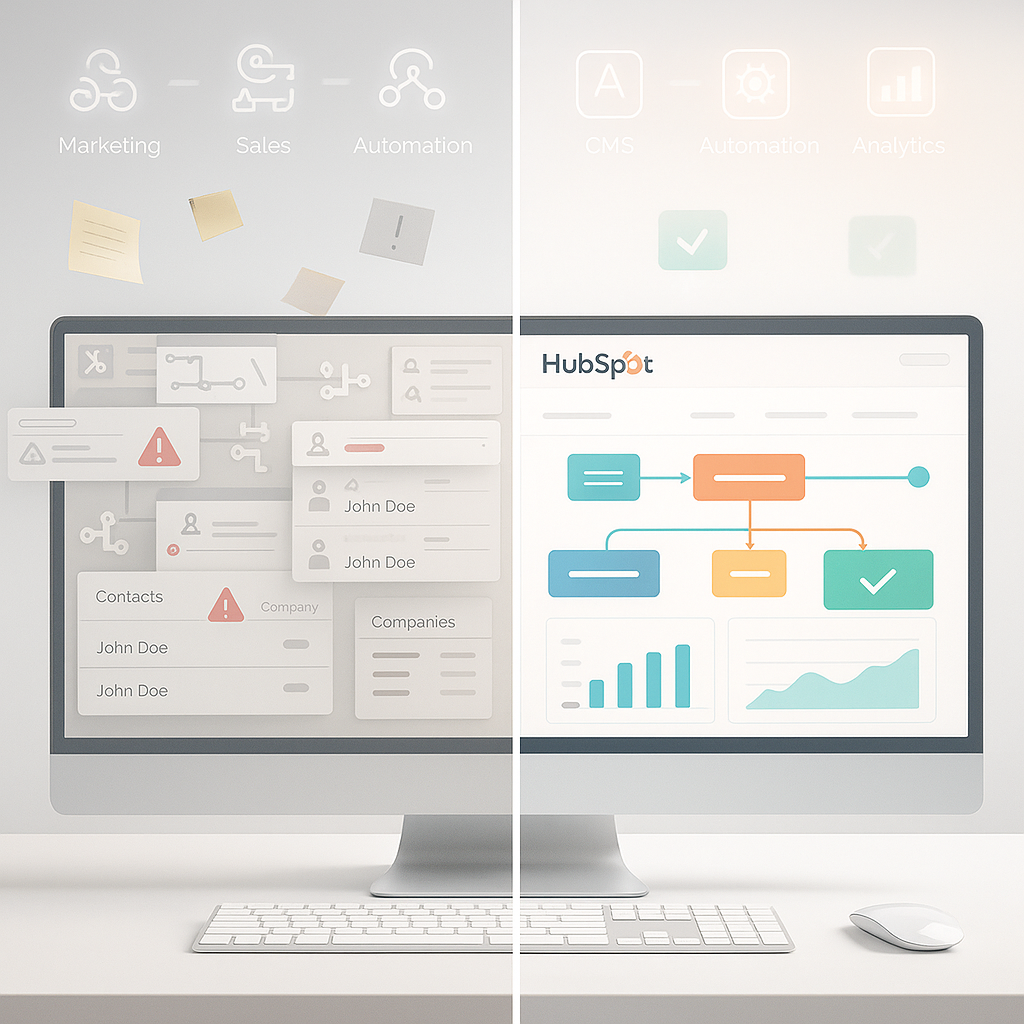How to Choose the Right HubSpot Website Design Agency for Your Business Goals
Your website drives your first impressions, your lead quality, and your sales pipeline. So why do so many businesses still treat it like a secondary...
%20(23).png?width=302&height=302&name=_SD%20web%20assets%202025%20(500%20x%20500%20px)%20(23).png)
11 min read
Marketing
:
Updated on April 8, 2025
Are you a small business owner looking to take your online presence to the next level? Look no further than HubSpot, the all-in-one content management system (CMS) that's changing the game for small businesses everywhere. In this comprehensive guide, we'll explore how HubSpot's powerful CMS tools can help you build a stunning website, create engaging content, and drive growth for your business. Whether you're just starting out or looking to scale, HubSpot has the right tools to support your journey. Read on to discover why HubSpot is the best CMS choice for small businesses and how it can transform your digital strategy.
HubSpot CMS (Content Management System) is a comprehensive and user-friendly platform that empowers businesses to create, manage, and optimize their website content seamlessly. Integrating effortlessly with HubSpot's suite of marketing, sales, and service tools, it provides an all-encompassing solution for inbound marketing and customer relationship management (CRM). This robust platform offers a variety of features, making it an excellent choice for small businesses.
One of the standout features of HubSpot CMS is its intuitive drag-and-drop editor. This allows users to create and customize web pages without needing extensive technical skills, a significant advantage for small businesses that may lack dedicated web developers. Additionally, websites built on HubSpot CMS are automatically optimized for mobile devices, ensuring a consistent and user-friendly experience across all device types. Another key feature is personalization; the CMS can deliver content tailored to visitor behavior, location, and other criteria, enhancing user engagement and conversion rates.
HubSpot CMS also includes built-in SEO tools that help small businesses improve their search engine rankings, making it easier for potential customers to find them online. The platform's native integration with HubSpot's CRM ensures seamless data flow between the website and customer management system, providing valuable insights into customer behavior and preferences. Comprehensive analytics and reporting tools allow businesses to track website performance, visitor behavior, and the effectiveness of their content strategies. Moreover, the content staging feature enables users to create and test changes in a staging environment before publishing them live, reducing the risk of errors and ensuring a smoother user experience. Security is another strong suit of HubSpot CMS, which includes robust features such as SSL certificates, web application firewalls, and regular threat monitoring, ensuring that small business websites remain secure and trustworthy.
HubSpot CMS stands out as a great choice for small businesses for several reasons. Its user-friendly design allows business owners or marketers to build and update their websites without needing extensive technical knowledge. As an all-in-one solution, the CMS integrates with HubSpot's marketing, sales, and service tools, providing a unified platform for managing all aspects of online presence and customer engagement. This integration reduces the need for multiple disparate systems, saving time and resources. As small businesses grow, HubSpot CMS can scale with them, offering advanced features and functionalities that can be added as needed without requiring a complete website overhaul. While it may not be the cheapest option on the market, HubSpot CMS offers significant value through its comprehensive features and integration capabilities, translating into a better return on investment compared to piecing together multiple tools.
HubSpot also provides extensive support resources, including a knowledge base, community forums, and customer support services, ensuring that small businesses have access to the help they need to resolve issues and optimize their use of the platform. The CMS's integration with HubSpot's marketing tools allows small businesses to easily execute and manage inbound marketing strategies, including content marketing, email marketing, and social media marketing, all from one platform. With integrated analytics, small businesses can make data-driven decisions to improve their website and marketing efforts, leading to better customer engagement and higher conversion rates. Additionally, HubSpot CMS offers a variety of professionally designed templates and themes that can be customized to reflect a business's brand, helping small businesses create a polished and professional online presence quickly.
In summary, HubSpot CMS is a powerful and versatile platform that provides small businesses with the tools they need to build, manage, and optimize their websites effectively. Its ease of use, integration capabilities, and comprehensive feature set make it an excellent choice for small businesses looking to enhance their online presence and drive growth.
When it comes to choosing the best CMS for your small business, it's important to compare HubSpot with other popular options. While platforms like WordPress offer a wide range of features, HubSpot's CMS stands out for several reasons.
Firstly, HubSpot's CMS is built with marketing in mind. Unlike traditional CMS platforms that focus primarily on content creation, HubSpot integrates content management with powerful marketing tools. This means you can not only create beautiful web pages but also track their performance, nurture leads, and optimize your content for better results—all from one platform.
Another advantage of HubSpot's CMS is its user-friendliness. While some CMS options require technical knowledge or coding skills, HubSpot's drag-and-drop editor and intuitive interface make it accessible for users of all skill levels. This ease of use can save small businesses time and resources, allowing them to focus on creating great content rather than wrestling with complex software.
Moreover, HubSpot's CMS offers robust security features and regular updates, ensuring that your website remains protected and up-to-date without requiring constant maintenance on your part. This peace of mind is invaluable for small businesses that may not have dedicated IT resources.
HubSpot's Content Hub is packed with features designed to empower small businesses in their content creation and management efforts. Let's explore some of the standout features that make HubSpot's CMS a top choice for marketers and developers alike.
HubSpot’s Content Hub is a comprehensive platform designed to help businesses manage, create, and optimize their content marketing efforts. Below is a detailed list of key features that make HubSpot’s Content Hub a powerful tool for content marketers:
These features collectively establish HubSpot's Content Hub as a comprehensive solution for businesses seeking to elevate their content marketing strategy, boost engagement, and increase conversions.
HubSpot's CMS is designed to help businesses of all sizes create professional, high-performing websites. Whether you're starting from scratch or looking to revamp your existing site, HubSpot provides the tools and resources you need to build a website that not only looks great but also drives results.
One of the standout features of HubSpot's website builder is its library of customizable templates. These professionally designed templates cover a wide range of industries and purposes, giving you a solid foundation to start from. You can easily modify these templates to match your brand's unique style and requirements.
For those who want more control over their website's design, HubSpot's CMS offers a flexible theme system. This allows developers to create custom themes that can be easily applied across your entire website, ensuring a consistent look and feel while still allowing for page-specific customizations.
HubSpot's CMS also excels in creating dynamic, personalized experiences for your visitors. With features like smart content, you can display different content to different visitors based on criteria like their location, device type, or stage in the buyer's journey. This level of personalization can significantly improve engagement and conversion rates.
Furthermore, HubSpot's CMS ensures that your website is optimized for mobile devices and loads quickly, both of which are crucial factors for user experience and search engine rankings. The platform also provides built-in content delivery network (CDN) capabilities, further enhancing your website's performance and reliability.
One of the most powerful aspects of using HubSpot's CMS is its seamless integration with HubSpot's Customer Relationship Management (CRM) system. This integration creates a unified platform that allows small businesses to manage their website, content, and customer relationships all in one place.
The CRM-CMS integration means that data flows freely between your website and your customer database. When a visitor fills out a form on your website, their information is automatically captured in the CRM. This allows you to track their interactions with your content over time, providing valuable insights into their interests and behaviors.
This integration also enables powerful personalization features. You can use data from your CRM to display targeted content on your website, creating a more relevant and engaging experience for each visitor. For example, you could show different offers or content to first-time visitors versus returning customers.
Moreover, the CRM-CMS integration helps streamline your marketing and sales processes. You can easily create landing pages, forms, and email campaigns that are directly connected to your CRM, allowing for seamless lead nurturing and customer communication.
HubSpot's CMS comes equipped with robust analytics tools that provide deep insights into your content's performance. These tools are designed to help small businesses make data-driven decisions about their content strategy and website optimization.
One of the key analytics features is the content performance tool. This allows you to see how individual pages and blog posts are performing in terms of views, engagement, and conversions. You can track metrics like page views, time on page, bounce rate, and conversion rate, helping you understand which content resonates most with your audience.
HubSpot also offers detailed traffic analytics, showing you where your visitors are coming from and how they're navigating through your site. This can help you identify your most effective traffic sources and optimize your site structure for better user experience.
For businesses focused on inbound marketing, HubSpot's analytics tools can track the entire customer journey. You can see how visitors move from first-time visitors to leads to customers, and understand which pieces of content play the most crucial roles in this journey.
Additionally, HubSpot's analytics integrate with its A/B testing tools, allowing you to experiment with different versions of your content and easily compare their performance. This data-driven approach to content optimization can lead to significant improvements in your website's effectiveness over time.
HubSpot's CMS is not just for small businesses—it's designed to grow with you as your business expands. This scalability makes it an excellent choice for businesses at various stages of growth, from startups to established companies looking to scale their operations.
As your business grows, your content needs will likely become more complex. HubSpot's CMS is equipped to handle this complexity, offering features like multi-language support, advanced SEO tools, and the ability to manage multiple websites from a single account. These features allow you to expand your online presence without outgrowing your CMS.
Moreover, HubSpot's CMS integrates with a wide range of third-party tools and platforms. This means that as your tech stack grows more sophisticated, you can easily connect your CMS with other business-critical systems, from e-commerce platforms to advanced analytics tools.
The platform also offers different tiers of service, allowing you to access more advanced features as your needs evolve. This tiered approach means you're never paying for more than you need, but you always have room to grow.
HubSpot's CMS is more than just a website builder—it's a comprehensive marketing tool that can help small businesses streamline their entire marketing strategy. By combining content management with marketing automation, HubSpot allows you to create, publish, and promote content more efficiently.
One of the key ways HubSpot streamlines marketing efforts is through its all-in-one approach. Instead of juggling multiple tools for different aspects of your marketing, HubSpot brings everything together in one platform. This includes email marketing, social media management, lead generation, and more.
HubSpot's CMS also includes features specifically designed to save time for marketers. For example, its content creation tools include SEO recommendations as you write, helping you optimize your content for search engines without needing to consult separate SEO tools.
The platform's marketing automation capabilities are another time-saver. You can set up workflows that automatically nurture leads, send personalized emails, and even adjust website content based on visitor behavior. This level of automation allows small businesses to run sophisticated marketing campaigns without a large marketing team.
Furthermore, HubSpot's reporting tools provide a comprehensive view of your marketing performance across all channels. This makes it easier to understand what's working, what isn't, and where to focus your efforts for the best results.
HubSpot understands that small businesses often need extra support to make the most of their CMS and marketing tools. That's why they offer a wealth of resources and support options to help you succeed.
One of the most valuable resources is HubSpot Academy, a free online learning platform that offers courses on everything from content marketing to SEO to using HubSpot's tools effectively. These courses can help you and your team develop the skills needed to maximize your use of the platform.
HubSpot also provides extensive documentation and how-to guides for all of its features. Whether you're trying to set up a new landing page or troubleshoot an issue, you'll likely find clear, step-by-step instructions in their knowledge base.
For more personalized support, HubSpot offers customer support via email, chat, and phone. The level of support you receive depends on your subscription tier, with higher tiers offering more direct and prioritized support.
Additionally, HubSpot has a vibrant community of users and partners such as SmithDigital to assist with HubSpot CMS websites development. The HubSpot Community forum is a great place to ask questions, share experiences, and learn from other users. For businesses that need more hands-on help, HubSpot has a network of certified partners who can provide services ranging from strategy consulting to custom development.
Getting started with HubSpot's CMS is a straightforward process, and the platform offers several options to suit different needs and skill levels.
For those who want to try before they buy, HubSpot offers a free CMS tool that allows you to create a website with up to 25 pages. This is a great way to familiarize yourself with the platform and see if it's the right fit for your business.
If you're ready to dive in, you can sign up for one of HubSpot's CMS Hub plans. These range from the Starter plan, which is suitable for most small businesses, to the Enterprise plan for larger organizations with more complex needs.
Once you've signed up, HubSpot provides a guided onboarding process to help you set up your account and start building your website. This includes choosing a template, customizing your design, and setting up your first pages.
For businesses that want to migrate an existing website to HubSpot, the platform offers tools and services to make the transition as smooth as possible. This includes the ability to import content from other CMS platforms and support for custom domain setup.
Remember, HubSpot's CMS is designed to be user-friendly, even for those without technical expertise. However, if you do need help, HubSpot's support team and extensive learning resources are always available to guide you through the process.
By leveraging HubSpot's CMS, small businesses can create professional websites, streamline their marketing efforts, and drive growth through effective content management and customer engagement. Whether you're just starting out or looking to take your online presence to the next level, HubSpot offers the tools and support you need to succeed in today's digital landscape.

Your website drives your first impressions, your lead quality, and your sales pipeline. So why do so many businesses still treat it like a secondary...

If your team relies on HubSpot but no one truly owns it, your growth is at risk. Marketing slows down, sales waste time chasing bad data, and...

You’ve invested in SEO, ads, and content. But your website still leaks leads. Why? Because traffic is only half the equation. What happens after...